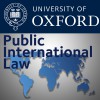Binding and Non-binding International Agreements (as explored by the OAS Juridical Committee)
Abstract: On 7 August 2020, the Inter-American Juridical Committee of the Organization of American States (OAS) adopted its Guidelines on Binding and Non-Binding Agreements. The project found its impetus in the rising number of non-traditional international agreements, including both non-binding agreements among States as well as binding and non-binding agreements concluded by government ministries and sub-national territorial units. Drafted over four years under the Rapporteurship of Professor Duncan B. Hollis (with input from Member States and other stakeholders) the guidelines and accompanying commentary address:
(i) definitions for each of the various forms of international agreement, including treaties, political commitments, contracts, and inter-institutional agreements;
(ii) the capacity of different State institutions to conclude different forms of international agreement;
(iii) the methods of identification employed in international practice to identify agreements by type;
(iv) the procedures States use to authorize and publicize their various forms of international agreements;
(v) the different legal effects, if any, that State practice suggests follows the conclusion of treaties, political commitments, contracts; and
(vi) training and other educational efforts to improve transparency in States’ law and practice with respect to both binding and non-binding agreements.
Translated by the OAS into four languages, the Guidelines and their accompanying Commentary provide a set of voluntary understandings and practices that States and other stakeholders may employ to improve knowledge on international agreements and, in doing so, reduce the risk of future inter-State and inter-institutional difficulties and disagreements.
Bio: Duncan B. Hollis is editor of the award-winning Oxford Guide to Treaties (2012, 2nd ed., 2020), International Law (7th ed., 2018, with Allen Weiner), and Defending Democracies: Combating Foreign Election Interference in a Digital Age (forthcoming 2021, with Jens Ohlin). He teaches in the areas of public international law and cybersecurity, which are also at the center of his research agenda.
Professor Hollis is a Non-Resident Scholar at the Carnegie Endowment for International Peace, an elected member of the American Law Institute, and a strategic consultant for the Microsoft Corporation’s Digital Peace Team. From 2016-2020, Professor Hollis served as an elected member of one of the Organization of American States’ principal organs -- the Inter-American Juridical Committee. There, he has served as Rapporteur for projects producing guidelines on binding and non-binding agreements as well as improving the transparency of how States understand international law applies in cyberspace. He is also the principal investigator for a grant from the Hewlett Foundation to offer a “boot camp” on technical issues in cybersecurity for non-technical experts. Most recently, Professor Hollis’s research led him to co-organize The Oxford Process on International Law Protections in Cyberspace, a process housed at the Oxford Institute for Ethics, Law and Armed Conflict that, to date, has produced three widely publicized statements on international law protections for healthcare, vaccine research, and elections.




